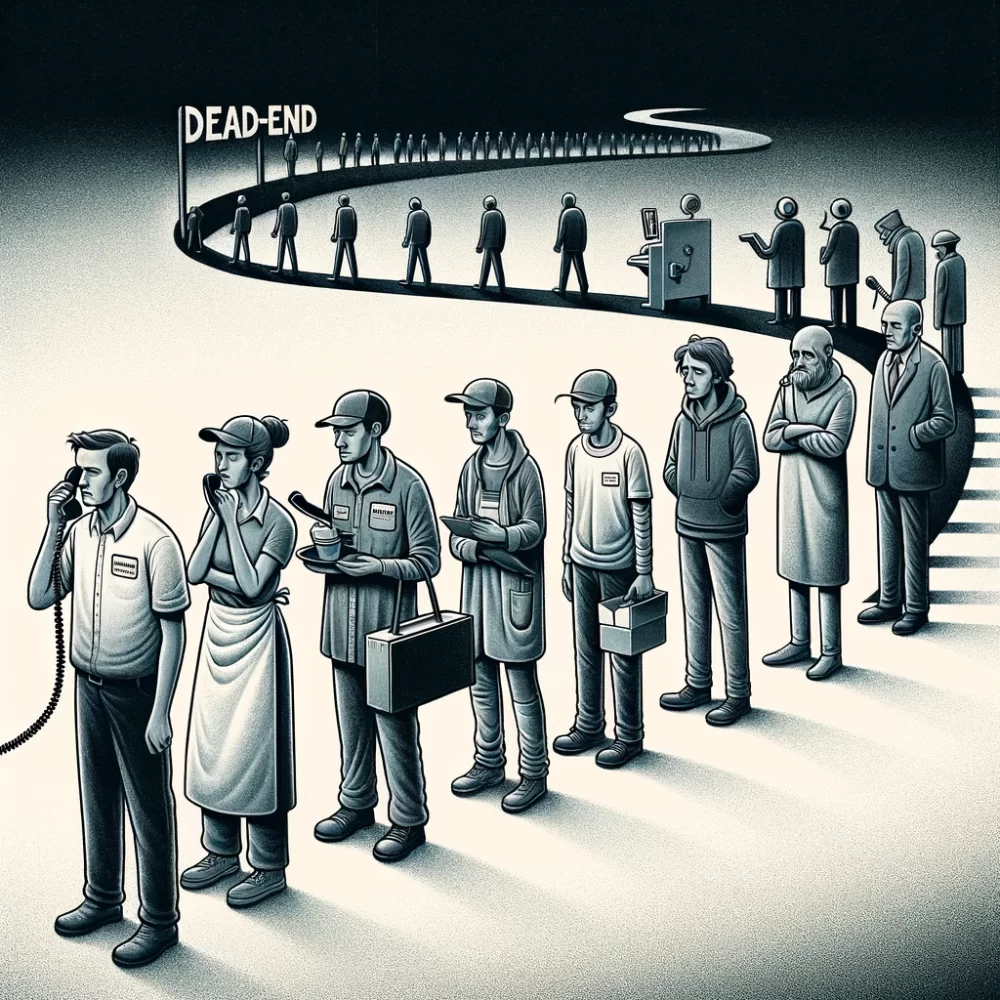Are you stuck in a dead-end job? Do you feel like you have no room for growth, no opportunity for advancement, and no chance of fulfilling your potential? If so, you’re not alone. Millions of people around the world are trapped in jobs that offer little or no satisfaction, pay poorly, and have bleak prospects for the future.
In an ever-changing job market, some professions are becoming increasingly stagnant. Here are ten such professions and the challenging realities they face.
1. Retail Sales Associates

The world of retail is often marred by low wages, limited growth opportunities, and the threat of automation. Retail sales associates face a challenging environment with minimal prospects for advancement. The rise of online shopping further threatens these roles, making physical retail positions less secure. Additionally, the lack of comprehensive benefits such as health insurance or retirement plans makes long-term financial planning difficult for those in this sector.
2. Food Service Workers

Food service jobs, including fast-food workers and waitstaff, often come with high stress, low pay, and irregular hours. The lack of benefits and career progression makes this a tough path for many. These positions are also susceptible to high employee turnover, leading to a constant state of instability and job insecurity. Furthermore, the physical demands and long hours can take a toll on workers’ health and well-being.
3. Telemarketers

Telemarketing has one of the highest turnover rates in any industry. With increasing automation and negative public perception, the future looks bleak for this profession. The repetitive nature of the job and frequent rejection can be demoralizing. Additionally, the rise of digital marketing techniques is reducing the demand for traditional telemarketing, making these roles less relevant.
4. Manual Laborers

Jobs involving manual labor, such as construction or factory work, can be physically demanding and often lack job security and upward mobility. These roles are also vulnerable to economic downturns, which can lead to sudden job losses. The physical toll of these jobs can lead to long-term health issues, further jeopardizing workers’ financial stability.
5. Administrative Assistants

Despite being the backbone of office operations, administrative roles are facing stagnation and are at high risk of being replaced by automated systems. These positions often have a ceiling in terms of advancement, limiting career growth. Moreover, the increasing trend of remote work can reduce the demand for in-person administrative support.
6. Cashiers

The role of cashiers is rapidly changing, with automation and self-service technologies reducing the need for human cashiers. Many cashier positions are part-time, offering little in the way of job security or benefits. The repetitive nature of the work and limited interaction can also be unsatisfying for those seeking more engaging employment.
7. Taxi Drivers

The rise of ride-sharing apps has significantly impacted the traditional taxi industry, leading to reduced demand and earnings for taxi drivers. This profession also faces challenges like long working hours and high operational costs, making it less attractive. The lack of a structured career path and unpredictable income further adds to the uncertainty.
8. Textile Workers

The textile industry faces challenges like outsourcing and automation, leading to a decline in traditional textile manufacturing jobs. Workers in this field often face low wages and poor working conditions. Additionally, the shift towards sustainable and ethical fashion is reshaping the industry, potentially leaving traditional skills behind.
9. Print Journalists

The shift towards digital media has drastically affected print journalism, with many publications facing declining circulation and revenue. The industry’s uncertainty has led to job cuts and reduced opportunities for aspiring journalists. Moreover, the rise of online platforms has changed the way news is consumed, further challenging traditional print media.
10. Bank Tellers

The banking sector’s shift towards digital services is reducing the need for traditional bank tellers, making this profession less secure. The role of bank tellers is evolving, requiring more technical skills and less personal interaction. Furthermore, the increasing preference for online and mobile banking solutions is likely to continue diminishing the demand for in-person banking services.
Embracing Change and Resilience

While these professions face significant challenges, it’s crucial for individuals to adapt, upskill, and stay resilient in the face of change. Exploring new career paths or gaining additional qualifications can open doors to more fulfilling and secure job opportunities.
What jobs do you know of that are dead-end jobs? Add them to the comments below:




